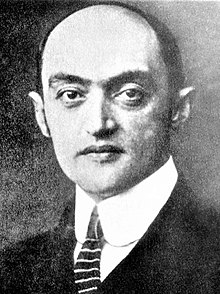Joseph A. Schumpeter
Joseph Alois Schumpeter (German: [ˈʃʊmpeːtɐ]; 8 February 1883 – 8 January 1950) was an Austrian-born American economist and political scientist. He briefly served as Finance Minister of Austria in 1919. In 1932 he became a professor at Harvard University where he remained until the end of his career. One of the most influential economists of the 20th century, Schumpeter popularized the term "creative destruction" in economics.
Schumpeter was born in Triesch, Habsburg Moravia (now Třešť in the Czech Republic, then part of Austria-Hungary) in 1883 to Catholic German-speaking parents. His father owned a factory, but he died when Joseph was only four years old. In 1893, Joseph and his mother moved to Vienna.
After attending school at the Theresianum, Schumpeter began his career studying law at the University of Vienna under the Austrian capital theorist Eugen von Böhm-Bawerk, taking his PhD in 1906. In 1909, after some study trips, he became a professor of economics and government at the University of Czernowitz. In 1911, he joined the University of Graz, where he remained until World War I.
In 1918, Schumpeter was a member of the Socialization Commission established by the Council of the People's Deputies in Germany. In March 1919, he was invited to take office as Minister of Finance in the Republic of German-Austria. He proposed a capital levy as a way to tackle the war debt and opposed the socialization of the Alpine Mountain plant. In 1921, he became president of the private Biedermann Bank. He was also a board member at the Kaufmann Bank. Problems at those banks left Schumpeter in debt. His resignation was a condition of the takeover of the Biedermann Bank in September 1924.
...
Wikipedia

